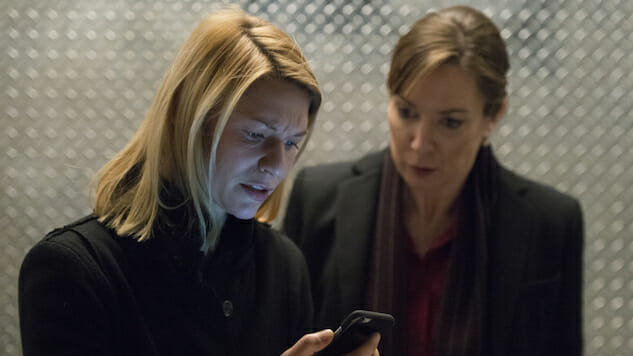Homeland: The Kill Zone
(Episode 6.12)
JoJo Whilden/SHOWTIME
The torture of a sitting senator. The attempted assassination of the president-elect. The death of a stalwart character. Gunfire. Explosions. Political purges. “America First,” which closes the book on an otherwise sedate season of Homeland, has all the elements of a 24-style thriller, but beyond “the kill zone,” as Carrie (Claire Danes) calls it—to the shell-shocked chagrin of Elizabeth Keane (Elizabeth Marvel)—the episode’s action is sorely misguided, constructing a coda that seems more interested in setting up the series’ seventh season than putting a punctuation mark on this one. For 26 minutes, Homeland fulfills expectations, throwing the viewer into its maelstrom with blunt efficiency; the remainder of the episode upsets expectations, making a mess of what came before.
As it dawns on Carrie that the Special Forces operating out of the suburban safe house poses a threat to the president-elect’s life, “America First” whirs into motion. Saul (Mandy Patinkin) attempts to assuage Keane’s fear that her appearance on The Real Truth has done more harm than good. (“What you did took balls,” he jokes. “People like a president with balls.”) Carrie and Quinn (Rupert Friend) head for the city with a warning. Dar (F. Murray Abraham) gathers that his plan to weaken Keane before she assumes office has spun out of control, and whatever his rationale for doing so—loyalty to Quinn, the desire to avoid punishment, genuine distress at the thought of such treason—it’s his phone call to Carrie that ultimately protects Keane from incineration. For a moment, at least, the season’s many moving parts click together, and the result is a torrid sequence in the bowels of a Manhattan hotel, as Carrie and Keane evade two merciless gunmen: From the murder of the leader of the president-elect’s Secret Service detail to her emergence from that black SUV comprises a few minutes at most, but it’s one of the highlights of the season.
Were Homeland to exhibit the patience it asks of its audience—stretching the tension to the length of the episode, or at least refusing to gloss Quinn’s death with a mere mention of his memorial service—the episode might count as a fitting cap to a solid, if unspectacular, season. As it stands, though, the final act of “America First” transforms more than 11 hours’ worth of staunch resistance to heedless militarism, the “deep state,” ultra-conservative commentators and alt-right media hoaxes into a moral muddle, one that might suit the tenor of the times but fails to suggest that the foregoing narrative was built atop any identifiable ideological position. With due respect to Marvel’s sterling performance—most notably, the chilling calm Keane exudes when Carrie arrives, screaming, at the Oval Office door—the implication that she’s a tyrant-in-waiting dangles off the end of the season as if clinging to a cliff for dear life. “This is payback, pure and simple,” Carrie says, enraged, at Keane’s intelligence community housecleaning, though Homeland refuses to leave it at that: What would Carrie corkboard next season, if not “the real truth” about the woman she once admired?
-

-

-

-

-

-

-

-

-

-

-

-

-

-

-

-

-

-

-

-

-

-

-

-

-

-

-

-

-

-

-

-

-

-

-

-

-

-

-

-








































